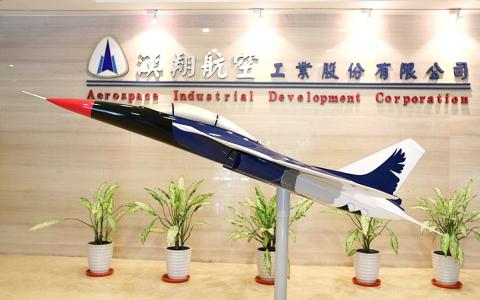Lawmakers yesterday proposed legislation that would require defense contractors to reserve part of the funds they receive from the government for defense-related research and development.
The proposal, which aims to revitalize the nation’s defense industry, was sponsored by Democratic Progressive Party legislators Liu Shyh-fang (劉世芳), Tsai Shih-ying (蔡適應), Chiu Chih-wei (邱志偉) and Chou Chun-mi (周春米), and New Power Party Legislator Freddy Lim (林昶佐), and was cosigned by 28 other lawmakers.
Companies awarded defense contracts of more than NT$100 million (US$3.25 million) should furnish 0.3 to 0.5 percent of the contract to a national defense industry development fund, which the government would establish, the bill says.

Photo: CNA
Should the bill pass into law, Aerospace Industrial Development Corp (漢翔航空) would have to pay at least NT$200 million of an advanced jet trainer program’s NT$69 billion contract value, a source familiar with defense contracting said on condition of anonymity.
Several defense contractors have expressed their misgivings, saying that the mandatory contributions would squeeze profit margins and reduce their willingness to bid for government contracts, the source said.
However, contractors have welcomed other aspects in the bill, the source said.
The legislation would allow the government to award contracts on a basis other than the lowest bid, the source said, adding that the government should be able to offset the negative effects of the mandatory contributions with tax credits.
The bill also calls for companies to have their military certification revoked if they or any of their personnel are indicted for leaking classified information, corporate espionage or corruption.
Authorities should restrict sanctioned companies from reapplying for military licenses for one to three years and immediately halt any projects they are handling, it says.

CHAOS: Iranians took to the streets playing celebratory music after reports of Khamenei’s death on Saturday, while mourners also gathered in Tehran yesterday Iranian Supreme Leader Ayatollah Ali Khamenei was killed in a major attack on Iran launched by Israel and the US, throwing the future of the Islamic republic into doubt and raising the risk of regional instability. Iranian state television and the state-run IRNA news agency announced the 86-year-old’s death early yesterday. US President Donald Trump said it gave Iranians their “greatest chance” to “take back” their country. The announcements came after a joint US and Israeli aerial bombardment that targeted Iranian military and governmental sites. Trump said the “heavy and pinpoint bombing” would continue through the week or as long

TRUST: The KMT said it respected the US’ timing and considerations, and hoped it would continue to honor its commitments to helping Taiwan bolster its defenses and deterrence US President Donald Trump is delaying a multibillion-dollar arms sale to Taiwan to ensure his visit to Beijing is successful, a New York Times report said. The weapons sales package has stalled in the US Department of State, the report said, citing US officials it did not identify. The White House has told agencies not to push forward ahead of Trump’s meeting with Chinese President Xi Jinping (習近平), it said. The two last month held a phone call to discuss trade and geopolitical flashpoints ahead of the summit. Xi raised the Taiwan issue and urged the US to handle arms sales to

State-run CPC Corp, Taiwan (CPC, 台灣中油) yesterday said that it had confirmed on Saturday night with its liquefied natural gas (LNG) and crude oil suppliers that shipments are proceeding as scheduled and that domestic supplies remain unaffected. The CPC yesterday announced the gasoline and diesel prices will rise by NT$0.2 and NT$0.4 per liter, respectively, starting Monday, citing Middle East tensions and blizzards in the eastern United States. CPC also iterated it has been reducing the proportion of crude oil imports from the Middle East and diversifying its supply sources in the past few years in response to geopolitical risks, expanding

Pro-democracy media tycoon Jimmy Lai’s (黎智英) fraud conviction and prison sentence were yesterday overturned by a Hong Kong court, in a surprise legal decision that comes soon after Lai was jailed for 20 years on a separate national security charge. Judges Jeremy Poon (潘兆初), Anthea Pang (彭寶琴) and Derek Pang (彭偉昌) said in the judgement that they allowed the appeal from Lai, and another defendant in the case, to proceed, as a lower court judge had “erred.” “The Court of Appeal gave them leave to appeal against their conviction, allowed their appeals, quashed the convictions and set aside the sentences,” the judges